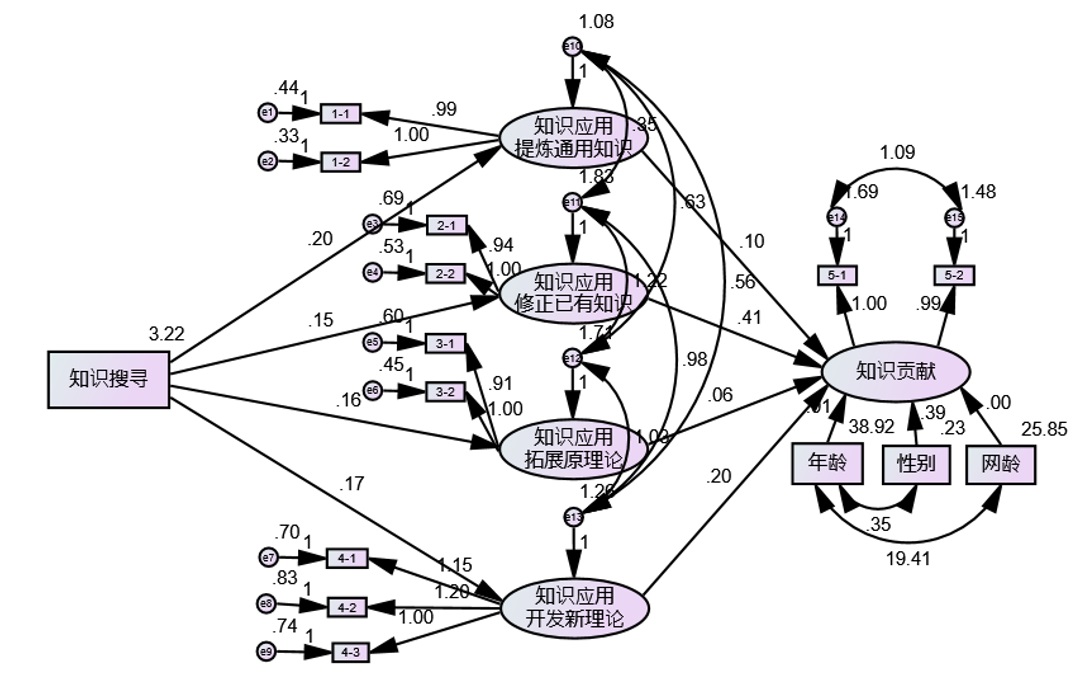 PDF(1337 KB)
PDF(1337 KB)


Study on Paths Model of Knowledge Proliferation in Professional Virtual Community
Zhao Xin, Zhao Lin, Li Jiaqian
Knowledge Management Forum ›› 2021, Vol. 6 ›› Issue (1) : 37-45.
 PDF(1337 KB)
PDF(1337 KB)
 PDF(1337 KB)
PDF(1337 KB)
Study on Paths Model of Knowledge Proliferation in Professional Virtual Community
[Purpose/significance] Based on Delone & Mclean's IS success model, This paper proposes a criterion, knowledge proliferation, to test the success of professional virtual community. In view of the shortcomings of the current research, this paper introduces the knowledge utilization, and points out that the knowledge application process can refine the general knowledge, modify the existing knowledge, expand the original theory and introduce the new theory. Then, this paper construct the paths model of knowledge proliferation in professional virtual community. [Method/process] Based on 332 valid questionnaires and using structural equation model, this paper empirically tested four paths of knowledge proliferation in professional virtual community. [Results/conclusion] The research finds that users first search for knowledge, then apply and modify knowledge, apply and develop new theories, and finally feed new knowledge back to PVC, which is the main paths to realize knowledge proliferation in professional virtual community.

professional virtual community / knowledge proliferation / knowledge utilization / path model
| [1] |
CHEN C J, HUNG S W. To give or to receive? factors influencing members’ knowledge sharing and community promotion in professional virtual communities [J]. Information & management, 2010, 47(4):226-236.
|
| [2] |
DELONE W H, MCLEAN E R. The DeLone and McLean Model of information systems success: a ten-year update[J]. Journal of management information systems, 2003, 19(4):9-30.
|
| [3] |
CHEN I Y L. The factors influencing members' continuance intentions in professional virtual communities — a longitudinal study [J]. Journal of information science, 2007, 33(4):451-467.
|
| [4] |
LIN H F. Determinants of successful virtual communities: contributions from system characteristics and social factors [J]. Information & management, 2008, 45(8):522-527.
|
| [5] |
CHIU C M, HSU M H, WANG E T G. Understanding knowledge sharing in virtual communities: an integration of social capital and social cognitive theories [J]. Decision support systems, 2006, 42(3):1872–1888.
|
| [6] |
ZHENG Y M, ZHAO K, STYLIANOU A. The impacts of information quality and system quality on users' continuance intention in information-exchange virtual communities: an empirical investigation [J]. Decision support systems, 2013, 56(1):513-524.
|
| [7] |
GANG K W, RAVICHANDRAN T. Exploring the determinants of knowledge exchange in virtual communities [J]. IEEE transactions on engineering management, 2015, 62(1):89-99.
|
| [8] |
PARK J H, GU B, LEUNG A C M, et al. An investigation of information sharing and seeking behaviors in online investment communities[J]. Computers in human behavior, 2014, 31(FEB.):1-12.
|
| [9] |
YAN Y L, DAVISON R M. Exploring behavioral transfer from knowledge seeking to knowledge contributing: the mediating role of intrinsic motivation [J]. Journal of the American Society for Information Science & Technology, 2013, 64(6):1144–1157.
|
| [10] |
李力. 虚拟社区用户持续知识共享意愿影响因素实证研究——以知识贡献和知识搜寻为视角[J]. 信息资源管理学报, 2016 (6):91-100.
|
| [11] |
赵欣,王倩雯,张长征. 从知识搜寻者到知识贡献者——PVC用户角色转变的机理研究[J]. 情报科学, 2017 (10):20-24.
|
| [12] |
赵欣,李佳倩,赵琳,等.在线社区的知识增值:用户行为与用户信任的互惠关系研究[J].现代情报,2020,40(10):84-92.
|
| [13] |
ZACK M H. Managing codified knowledge [J]. Sloan management review, 1999,40(4):45-58.
|
| [14] |
李金明, 戴昌钧. 知识原理、知识具体与企业知识创新[J]. 南开管理评论, 2002, 5(1):70-74.
|
| [15] |
汤建民. 类比源、类比泉和类比知识单元[J]. 科学学研究, 2003, 21(5):467-469.
|
| [16] |
MARKUS M L, MAJCHRAZAK A, GASSER L. A design theory for systems that support emergent knowledge process [J]. MIS quarterly, 2002,26(3):179-212.
|
| [17] |
YAKHLEF A. Knowledge transfer as the transformation of context[J]. Journal of high technology management research, 2007, 18(1):43-57.
|
| [18] |
MARKUS M L. Toward a theory of knowledge reuse: types of knowledge reuse situations and factors in reuse success[J]. Journal of management information systems, 2001, 18(1):57-93.
|
| [19] |
黄梦婷, 张鹏翼. 社会化问答社区的协作方式与效果研究:以知乎为例[J]. 图书情报工作, 2015,54(12):85-92.
|
| [20] |
CHEN L, BAIRD A, STRAUB D. Why do participants continue to contribute? evaluation of usefulness voting and commenting motivational affordances within an online knowledge community[J]. Decision support systems, 2019, 118(3): 21-32.
|
| [21] |
BHATTACHERJEE A. Understanding information systems continuance: an expectation-confirmation model[J]. MIS quarterly, 2001, 25(3):351-370.
|
| [22] |
BHATTACHERJEE A, BARFAR A. Information technology continuance research: current state and future directions[J]. Asia Pacific journal of information systems, 2011, 21(2):1-18.
|
| [23] |
ARASE Y, XIE X, HARA T, et al. Mining people's trips from large scale geo-tagged photos[C]// Proceedings of international conference on multimedia 2010. Firenze: DBLP, 2010:133-142.
|
| [24] |
BRAUNHOFER M, RICCI F. A context-aware model for proactive recommender systems in the tourism domain[C]// Proceedings of international conference on human-computer interaction with mobile devices and services adjunct. New York: ACM, 2015:1070-1075.
|
| [25] |
蒋建洪, 马瑞云. 基于文本挖掘的个性化旅游偏好特征属性分析[J]. 企业经济, 2017(12):129-133.
|
| [26] |
ALAVI M, LEIDNER D E. Review: Knowledge management and knowledge management systems: conceptual foundations and research issues [J]. MIS quarterly, 2001,25(1):107-136.
|
赵欣: 提出知识增值概念、路径假设,修改论文;
赵琳: 进行数据分析与论文执笔;
李佳倩: 进行数据收集与数据分析。
/
| 〈 |
|
〉 |